As a UK foster carer, you can access numerous training programs. Before becoming a carer, a pre-approval training teaches you essential skills. The 'Skills to Foster' program provides necessary tools for successful fostering. Post-approval training offers easily accessible online courses and workshops. Specialized programs help cater for children with complex needs. Continual support and development training, as well as online resources, are available throughout your journey. Therapeutic fostering, adoption, and discrimination prevention are other critical areas of learning. Stay enthusiastic as there's more knowledge to uncover to excel in your foster carer journey.
Key Takeaways
- UK foster carers undergo pre-approval training, equipping them with skills to care for traumatized children.
- The Skills to Foster Training Program provides essential knowledge for fostering, including financial literacy and resilience building techniques.
- Specialized Training for Complex Needs focuses on behavior management and understanding trauma impacts for children with unique requirements.
- Ongoing Support and Development Training offers consistent training throughout the year, tailored based on experience and needs.
- Online training resources like The Fostering Network and CoramBAAF provide web-based platforms for self-paced learning.
Understanding UK Foster Care System
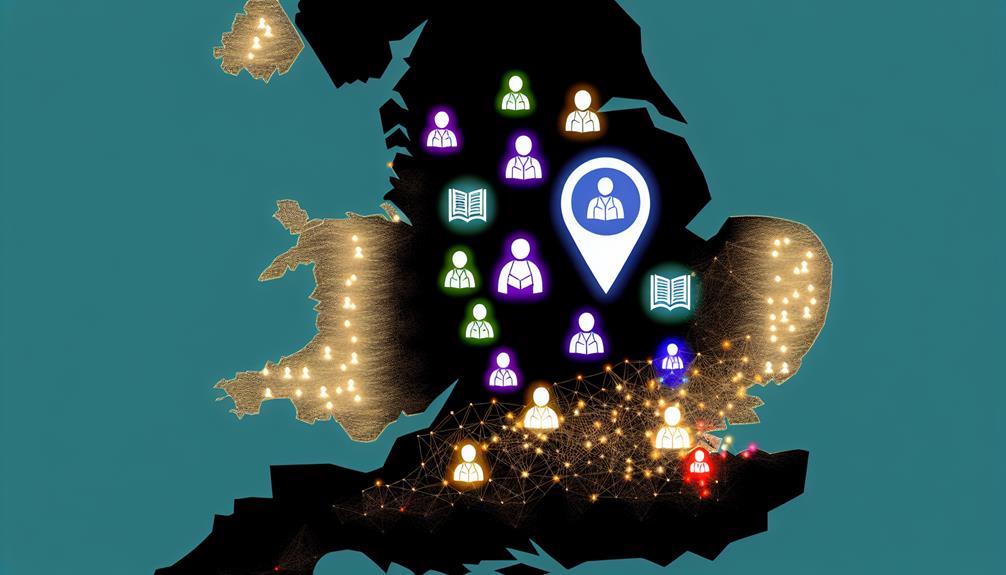
To fully grasp the intricacies of the UK foster care system, it's important to explore its structure, process, and the essential role each stakeholder plays. The system operates under the strict guidelines of Foster Care Legislation and Child Welfare Policies.
As you delve further, you'll uncover that Foster Care Legislation in the UK is thorough and continually evolving to guarantee the highest standards of care for children. It's an elaborate web of regulations and standards, which governs everything from the selection process for foster carers to the rights and wellbeing of children in foster care.
Equally essential are the Child Welfare Policies, which serve as the backbone of the system. These are designed to protect children and promote their best interests. They dictate how foster carers should treat children in their care, what support services are available, and how child protection issues are handled.
Each stakeholder, from the social workers to the foster carers, plays a crucial role in implementing these laws and policies. Their collective responsibilities ensure that the system runs smoothly, children's rights are upheld, and their needs are met. Understanding these fundamentals is key to mastering your role within this complex system.
Pre-Approval Training for Prospective Carers
Prior to starting on your path to become a foster carer in the UK, it's essential to grasp the approval process. It's not only about checking off boxes, but also acquiring the necessary skills to effectively care for and support a child in need.
The advantages of pre-approval training are numerous, equipping you with the tools and confidence to navigate this fulfilling yet demanding role.
Understanding the Approval Process
Guiding through the approval process, including pre-approval training, is an essential step on your journey to becoming a foster carer in the UK. This process can seem intimidating, but understanding the approval timeline can make it less overwhelming. It usually takes around six months from initial enquiry to approval. This time allows for thorough checks and preparation, dispelling any foster care myths you may have encountered.
Pre-approval training is a vital part of the process. It equips you with the knowledge and understanding to care for a child who may have experienced trauma. This training lays the foundation for your foster care journey, helping to make sure that you're ready and capable to provide a safe, nurturing environment for a child in need.
Required Skills Development
In the pre-approval training phase, you'll undergo a thorough skills development program designed to equip you with the necessary tools to successfully navigate the intricacies of fostering. This all-inclusive curriculum includes understanding carer retention strategies to make sure you're prepared for the long-term commitment that fostering entails. You'll learn techniques for maintaining resilience in challenging situations, effectively communicating with children of diverse backgrounds, and managing behavioural issues.
Additionally, as fostering is a financial undertaking, the program offers financial planning advice. You'll gain insights into budgeting, understanding the foster care allowances and grants, and managing unexpected costs. This financial literacy component will empower you to provide a stable environment for your foster child, while safeguarding your own financial well-being.
Pre-Approval Training Benefits
Having gone through the extensive skill development program, you'll soon discover the manifold benefits that pre-approval training brings to prospective carers like you. This preliminary training not only enhances your caregiving skills but also bolsters training effectiveness. It equips you with the necessary tools to handle complex situations, mitigating potential caregiver burnout.
You'll learn to navigate the foster care system, understand the unique needs of foster children, and develop robust strategies to support them. The training also prepares you emotionally, teaching you to manage stress effectively and prevent burnout.
In essence, pre-approval training provides a solid foundation for your journey as a foster carer. It's a valuable investment in your personal growth and the well-being of the children you'll care for.
Skills to Foster Training Program
While you're considering the path of foster care, it's vital to explore the 'Skills to Foster Training Program', a detailed course designed to equip potential carers with the necessary knowledge and tools for successful fostering. This program delves into essential aspects of care, including financial literacy training and resiliency building techniques.
Financial literacy training is an integral part of this program. It's not just about managing finances for the foster child, but also about teaching them how to manage their own money in the future. You'll be guided through the intricacies of budgeting, saving, and even investing, providing a solid financial foundation for both you and your foster child.
Resiliency building techniques are equally important. As a foster carer, you'll likely face a variety of challenges. This program equips you with methods to adapt, persevere, and thrive amidst these hurdles. Additionally, you'll learn how to foster resilience in the children under your care, helping them navigate their own difficulties with strength and grace.
The 'Skills to Foster Training Program' is thorough and indispensable for anyone serious about providing quality foster care. It doesn't just prepare you for the role, it sets you up for success.
Post-Approval Training Opportunities
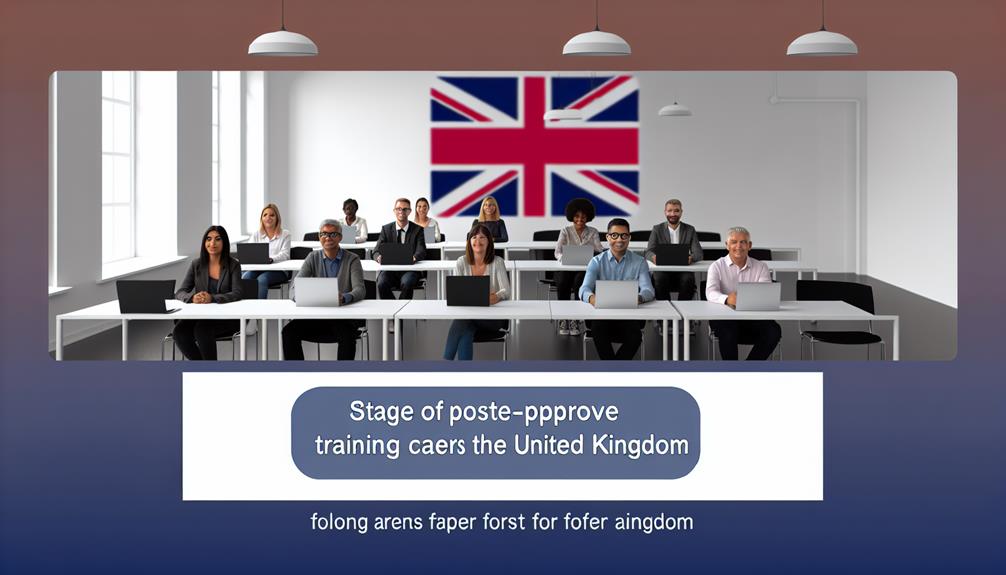
Once you've completed the 'Skills to Foster Training Program' and officially become a foster carer, there's a wealth of post-approval training opportunities available to further enhance your skills and knowledge.
The key here is training accessibility, and the UK provides numerous options for foster carers. Here are four notable ones:
- Online Courses: These are important, accessible, and tailored to fit your schedule. They cover a wide array of topics, from managing challenging behaviours to understanding child development.
- Workshops and Seminars: These interactive sessions provide a platform for you to learn from experienced trainers and fellow carers.
- Mentoring Programs: Here, you're matched with a seasoned carer who provides guidance, shares experiences, and offers emotional support.
- Self-Care Training: This is essential to prevent caregiver burnout. It focuses on the importance of looking after your mental and physical health, ensuring you're in the best possible shape to care for your foster child.
Specialized Training for Complex Needs
As a UK foster carer, you may encounter children with complex needs that require specialized training.
This training often covers critical areas such as behaviour management strategies and understanding the impact of trauma.
Both of these skills are essential to effectively support and nurture children with unique and challenging requirements.
Behaviour Management Strategies
In the domain of specialized training for UK foster carers, mastering behavior management strategies is vital for dealing effectively with complex needs. Whilst implementing a reward system and developing emotional intelligence are key starting points, there's more you need to learn.
- Implementing Rewards System: This approach encourages positive behaviors by using rewards as motivation. You'll need to understand the child's interests to create an effective system.
- Developing Emotional Intelligence: Understanding, managing, and responding to the child's emotions is essential. This skill helps to build stronger bonds and promote better communication.
- Setting Boundaries: Clear and consistent rules provide a sense of security and help manage expectations.
- Conflict Resolution: Learn to mediate and resolve conflicts in a calm, fair way, promoting healthy relationships and a peaceful environment.
Understanding Trauma Impact
Often, you'll find that understanding the impact of trauma on a child's behaviour and development is an essential part of specialized training for complex needs in foster care. This knowledge enables you to identify trauma coping mechanisms that a child may be using. You'll learn to spot signs of distress, helping the child navigate tumultuous emotions and behaviours.
Training also includes the teaching of emotional resilience techniques. These methods help children bounce back from adverse experiences, fostering a healthier mental and emotional state. You'll be equipped to aid in their recovery process, building a stable, nurturing environment.
Ongoing Support and Development Training
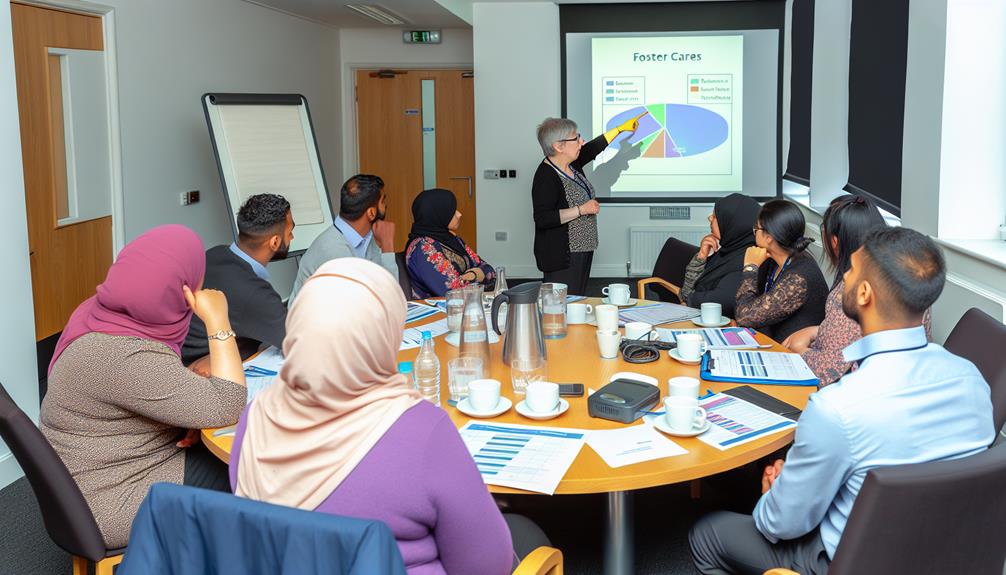
To guarantee your success as a foster carer, extensive ongoing support and development training programs are essential, equipping you with the necessary skills and knowledge to tackle the unique challenges you may encounter. It's important to understand the training frequency and the financial support available to you as you navigate this journey.
- Training frequency: It's not a one-and-done deal. Training is ongoing, with regular sessions scheduled throughout the year. This ensures that you're always equipped with the latest knowledge and best practices to provide the best care.
- Financial support: Don't worry about the cost. The UK government provides allowances to cover the cost of these trainings, ensuring that financial barriers don't hinder your ability to provide quality care.
- Tailored training: As you gain experience, the training evolves to meet your specific needs. This could range from dealing with children with special needs to managing challenging behaviors.
- Peer support: Alongside formal training, you'll have access to an invaluable network of experienced foster carers who can provide advice, share experiences, and offer support.
Online Training Resources for Foster Carers
Let's shift our focus to online training resources for foster carers.
You'll find a wealth of web-based training platforms that offer a flexible approach to learning.
They bring numerous benefits including convenience and the ability to learn at your own pace.
Web-Based Training Platforms
In the digital age, you'll find a variety of web-based training platforms offering extensive online resources for foster carers in the UK. These platforms employ digital pedagogy, providing interactive modules tailored to your needs and learning pace.
Here are four standout resources:
- The Fostering Network: Their online learning system, 'FosterTalk', covers a wide range of topics, from the basics of foster care to more significant issues.
- CoramBAAF: They offer an e-learning hub with modules on legal aspects, health, and more.
- Skills to Foster Online: This platform allows you to learn at your own pace, with modules on caring for children of different ages.
- Academi Wales: Their digital learning platform focuses on leadership and management training, which is essential for effective foster care.
Benefits of Online Training
Online training provides several compelling benefits to foster carers, ranging from flexibility in scheduling to access to a wide array of resources. Digital literacy, a key skill in today's technology-driven age, is inherently improved as you navigate online modules. This, in turn, enhances your ability to support children in their own digital learning journeys.
Online training also provides flexible learning opportunities, allowing you to fit sessions around your busy schedule. You aren't bound by set class times, meaning you can learn at your own pace, replaying sections as needed. Plus, you have access to a wealth of resources at your fingertips. From in-depth articles to engaging video tutorials, the learning possibilities are virtually limitless.
Enhance your foster carer skills today by harnessing the power of online training.
Therapeutic Fostering Training
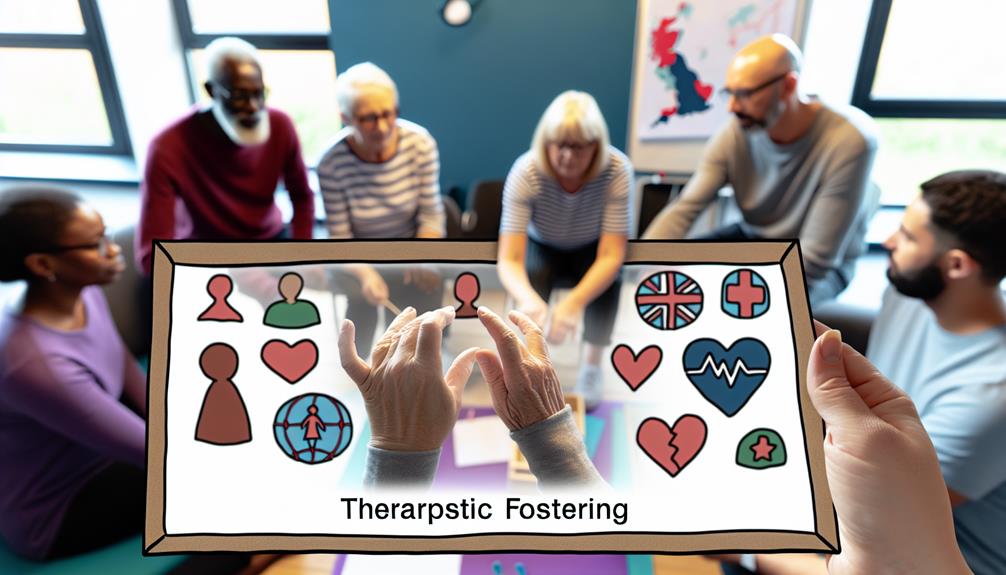
To better equip yourself for the unique challenges in therapeutic fostering, you'll benefit from a range of specialized training programs available across the UK. These programs focus on fostering self-care and exploring attachment theory, among other essential topics.
- Fostering Self-Care: This training explores the importance of self-care for foster carers. It delves into practical strategies to maintain your well-being while providing quality care.
- Attachment Theory Exploration: This module investigates the principles of attachment theory. You'll learn how it influences a child's development and how you can foster secure attachments.
- Trauma-Informed Care: Understand the impact of trauma on a child's behaviour and emotions. Learn how to provide a supportive environment that aids in their recovery.
- Behaviour Management: Gain insights on behaviour management strategies. Learn how to respond effectively to challenging behaviour, promoting a positive fostering environment.
These programs won't only deepen your understanding of therapeutic fostering but also enhance your skills. With this knowledge, you can provide a nurturing environment that promotes healing and growth for the children in your care. Remember, your journey towards mastery in therapeutic fostering begins with effective training.
Adoption and Permanency Training
Beyond therapeutic fostering, there's another area of training you should consider – adoption and permanency training. This training is essential, addressing adoption legislation changes and the complexities of permanency planning challenges.
With the fluctuating landscape of adoption laws, staying abreast of the current legislation is a must. Courses on adoption legislation changes equip you with knowledge on legal parameters, ensuring you navigate adoptions effectively and ethically. They shed light on the rights of all parties involved, the adoption process, and the legal implications of adoption.
Permanency planning, on the other hand, can present its own set of challenges. Permanency training is designed to equip you to handle these challenges, ensuring the child's welfare is prioritised. It helps you understand the child's needs, the importance of stability, and the role you play in their life journey.
Whether you're considering adoption or focused on providing a stable environment for a foster child, these training courses are invaluable. They arm you with the necessary knowledge, skills, and understanding to provide the best care possible. Remember, your role is vital, and the right training can make all the difference. So, don't hesitate to explore adoption and permanency training opportunities. They're certainly worth your time and effort.
Celebrating Diversity and Equal Opportunities Training
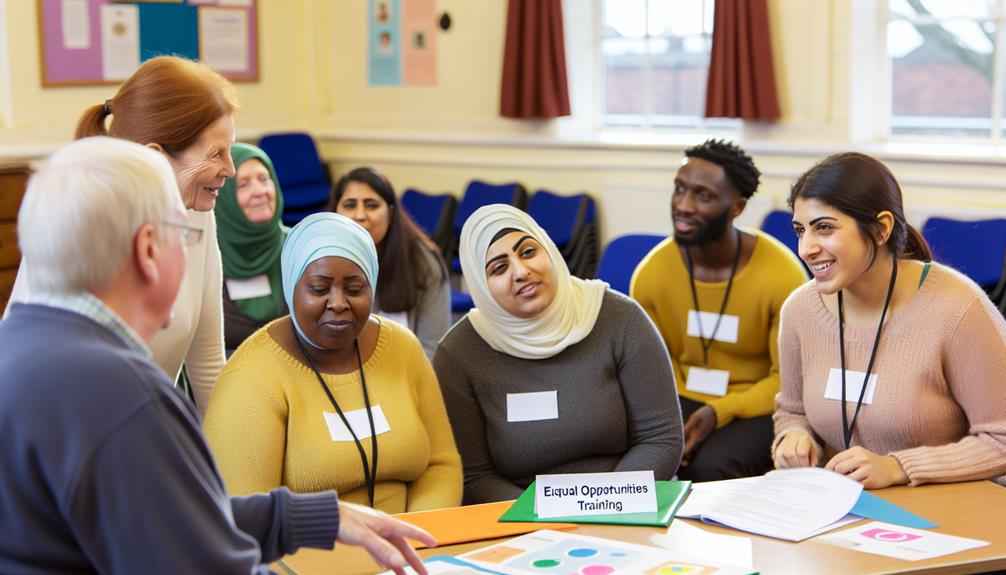
In the diverse landscape of foster care, 'Celebrating Diversity and Equal Opportunities Training' plays an essential role, equipping you with the knowledge and skills to provide care that respects and honors each child's unique background and identity. This training ensures you're well-prepared to nurture children from diverse cultures, religions, and ethnicities.
This course focuses on several integral areas:
- Cultural Awareness: You'll learn about different cultures, traditions, and customs. This knowledge helps you to better understand and support each child's cultural needs.
- Discrimination Prevention: The training equips you with strategies to prevent and address discrimination. You'll learn to foster an environment of respect and acceptance.
- Legal Frameworks: You'll get to understand the national and local laws that uphold equality and diversity. This understanding guarantees you're always in compliance.
- Communication Skills: The course enhances your ability to communicate effectively with children of diverse backgrounds.
Mastering these areas guarantees you're able to provide a supportive, respectful, and inclusive environment for all children in your care. The 'Celebrating Diversity and Equal Opportunities Training' is indeed a vital part of your journey as a foster carer.
Frequently Asked Questions
What Financial Support Is Available for UK Foster Carers?
You've several funding options as a UK foster carer. You're entitled to a weekly allowance, tax benefits, and potentially additional payments. It's important to understand these financial supports to maximise your fostering experience.
Can Single Individuals Also Become Foster Carers in the Uk?
Yes, you can become a foster carer in the UK as a single individual. Despite single parent challenges, adopting alone is possible. You'll need resilience, a support network, and flexibility to manage the demands.
What Are the Legal Rights of Foster Carers in the Uk?
In the UK, as a foster carer, you've 'adoption rights,' but not full parental rights. You've 'guardian responsibilities' for daily care, but major decisions lie with the child's legal parents or local authority.
Can Foster Carers Choose the Age or Gender of the Child They Foster?
Yes, you can express preferences regarding the age or gender of the child you'd like to foster. However, these preferences impact placement availability. Age considerations are essential in building a harmonious foster home.
What Is the Process for Transferring From One Fostering Agency to Another in the Uk?
To switch between fostering agencies in the UK, you'll first need to assess agency selection. Consider the shift challenges you might face, such as differing policies, before making a well-informed decision.
Conclusion
So, you've got an array of training opportunities, from pre-approval courses to specialized programs for complex needs.
Online resources and therapeutic fostering training are at your fingertips.
Embracing diversity and understanding adoption processes are part of it too.
It's not just about learning, it's about growing as a carer.
Because when you're equipped with the right skills and knowledge, you're not just fostering a child, you're nurturing a future.




